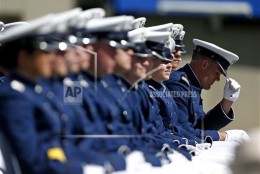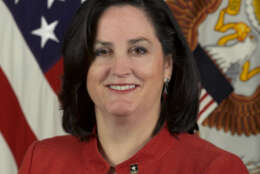Defense
-
The Defense Department has teamed up with the National Collegiate Athletic Association to study the effects of concussions on service members and student-athletes. The project is run by a group of investigators dubbed the Concussion Assessment, Research and Education, or CARE, Consortium. Steve Broglio is an associate professor of kinesiology at the University of Michigan and director of the NeuroTrauma Research Lab, one of the consortium's three research branches. He tells Federal News Radio's Matt Wingfield more about the consortium.
October 01, 2015 -
Congress is set to vote on the National Defense Authorization Act, following an agreement by House and Senate negotiators. The bill is a mixed bag where service members' pocketbooks are concerned. Retired Vice Adm. Norb Ryan is president and CEO of the Military Officers Association of America. He told Federal News Radio's Emily Kopp he is disappointed that troops will get a 1.3 percent pay raise in January.
October 01, 2015 -
Defense Secretary Ashton Carter says he and other members of the president’s national security team have advised President Barack Obama to veto the defense authorization bill Congressional negotiators have agreed on. The White House says the president indeed plans to veto it. Federal News Radio’s DoD reporter Jared Serbu has more.
October 01, 2015 -
Defense Secretary Ashton Carter said Wednesday that he has advised President Barack Obama to veto the Defense Authorization bill Congress will vote on later this week for several reasons.
October 01, 2015 -
The Defense Information Systems Agency awarded a $1.8 million contract to Advanced Onion to build websites that help potential hack victims see if they've been affected by the breach.
October 01, 2015 -
The defense authorization bill agreed upon by House and Senate negotiators would affect military pocketbooks in ways both big and small. It includes a 1.3 percent pay increase for uniformed service members but chips away at the military's pension system. In exchange for shrinking pensions, it encourages current troops — and mandates that future ones — invest in the Thrift Savings Plan.
September 30, 2015 -
The Defense Authorization Act will expand milestone decision authority for military service chiefs, it just has to get past President Obama first.
September 30, 2015 -
The Defense Department wants to make sure the electronic parts it uses aren’t tainted. In a new proposed rule expansion, DoD would require contractors to have a risk-based system to trace electronic parts from their original equipment manufacturer and subcontractors. The goal is to crack down on counterfeit electronic parts. Chris Myers is a partner and assistant chair of the Government Contracts Group at Dentons. He joins the Federal Drive with Tom Temin with more on the proposal.
September 30, 2015 -
After months of on-and-off talks, House and Senate negotiators reached an agreement yesterday on the Defense authorization bill for 2016. The legislation would make sweeping changes to the military’s personnel and acquisition systems. But as Federal News Radio’s Jared Serbu reports, it’s almost certain to be vetoed for entirely different reasons.
September 30, 2015 -
Thursday isn't just the beginning of the new fiscal year. It's the first day of Energy Action Month. It's an important month for the Army. Katherine Hammack, assistant secretary of the Army for Installations, Energy and Environment, tells In Depth with Francis Rose why Energy Action Month matters to the Army and what it will mean for the force's mission.
September 30, 2015 -
More cadets at West Point suffer concussions from mandatory boxing classes than from any other activity, including football. When The New York Times wanted to learn more about why, the Army appeared to prevent the Times from getting the information its reporter wanted until it could try to convince The Wall Street Journal and USA Today to run stories that supported its position on concussion research. Neither newspaper ever ran a story like that. Phil Carter, is retired from the Army retired and is a senior fellow, counsel and director of the Military, Veterans and Society Program at the Center for a New American Security. He told In Depth with Francis Rose these stories are important for a couple of reasons.
September 30, 2015 -
House and Senate negotiators finally shook hands Tuesday on a defense authorization bill both parties generally support and would enact some of the most sweeping and aggressive changes to the military’s personnel and acquisition systems in several decades.
September 30, 2015 -
Reps. Don Beyer (D-Va.) and Rob Wittman (R-VA) introduced the Federal Employee Retroactive Pay Fairness Act, which would secure retroactive pay for all federal employees during a government shutdown, regardless of furlough status.
September 29, 2015 Senate Armed Services Committee Chairman John McCain (R-Ariz.) and other members are pushing Defense officials for a definitive policy on cyber attacks.
September 29, 2015-
Defense Department Chief Information Officer Terry Halvorsen made some waves earlier this year when he said he’d like to see commercial companies construct and operate data centers on DoD property. The military would provide physical and cyber security, while the firms would bring the cost and scalability benefits of cloud technology. Now, the Army is ready to try out a version of that idea. Federal News Radio's DoD reporter Jared Serbu writes about this in the latest edition of Inside the DoD Reporter's Notebook.
September 29, 2015










